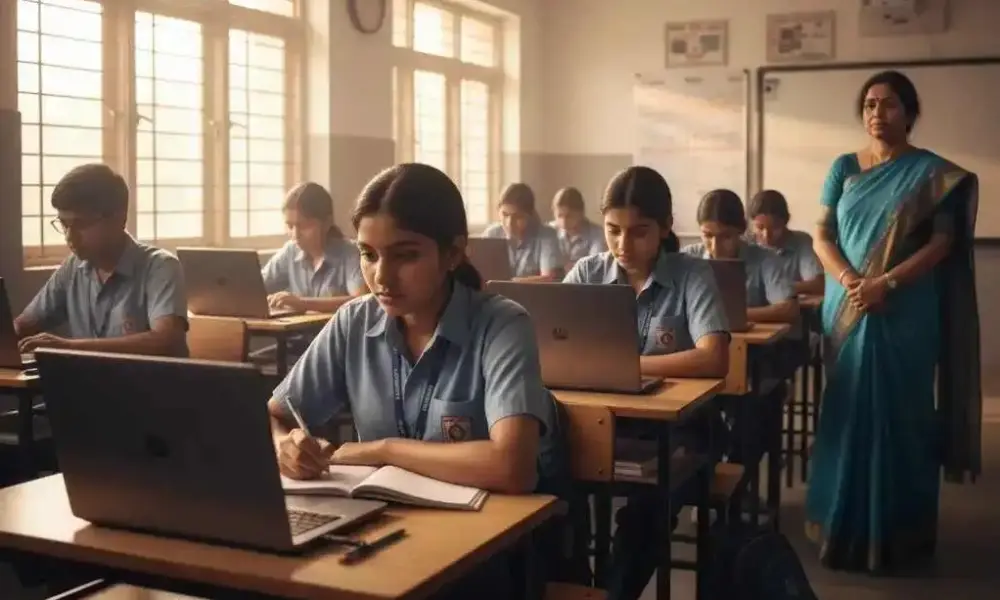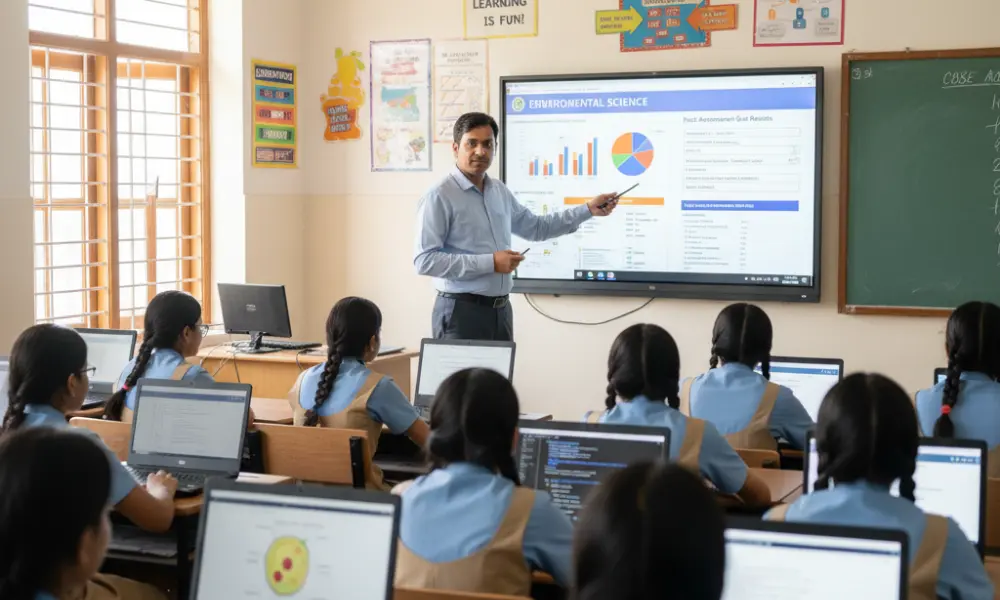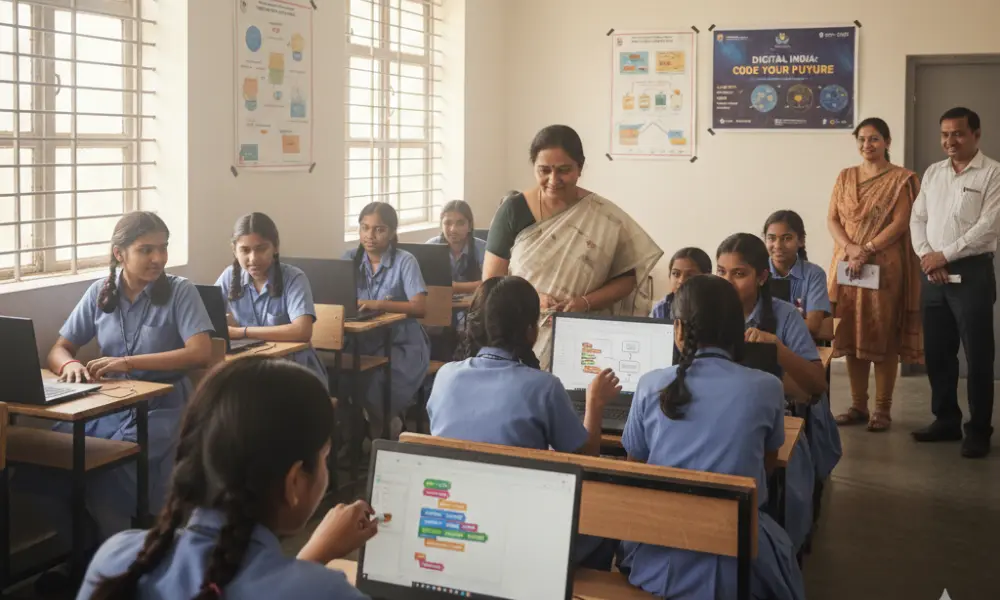How AI and adaptive testing could reshape CBSE exams for future-ready students
This blog explores the evolving landscape of CBSE exams, from AI-driven adaptive testing to global trends in digital assessments. It discusses benefits, challenges, and what students, parents, and teachers can expect in the coming years while highlighting how platforms like Edzy prepare learners for this shift.

The Central Board of Secondary Education (CBSE) has long been the standard for academic evaluation in India. However, with the rapid rise of digital education and the goals outlined in the National Education Policy (NEP) 2020, the nature of examinations is set to change. Traditional pen-and-paper tests focus heavily on memory recall, but the future demands assessments that measure problem-solving, creativity, and application of knowledge. This shift is essential to prepare students for competitive exams, higher education, and global workplaces that require more than rote learning.
Across the world, countries are rethinking how they test students. For instance, Singapore and Finland have integrated computer-based exams that allow real-time problem-solving and adaptive difficulty levels. Standardized tests like the GRE and GMAT already use adaptive models, where the difficulty of questions changes depending on the student’s performance. These global practices show that digital assessments not only save time but also provide a more accurate picture of a student’s abilities. India, through CBSE, is gradually moving in this direction, with pilot projects on digital literacy and AI-based learning already underway.
One of the most exciting possibilities is AI-driven adaptive testing. In this model, no two students receive the exact same paper. Instead, the test adjusts dynamically: if a student answers a question correctly, they may face a slightly more challenging one next; if they answer incorrectly, the next may be easier. This ensures that the final score reflects not just what a student knows, but how they think and adapt. Adaptive testing also reduces cheating, as the question sets are personalized. CBSE could integrate this model gradually, starting with optional online assessments before expanding into board-level exams.
A common criticism of traditional exams is that they don’t always reflect true learning. Technology can address this by offering:
Personalized question papers that adjust to individual learning curves
Instant evaluation through AI, reducing human error in marking
Detailed feedback for students, highlighting strengths and areas for improvement
Reduced dependency on rote memorization by emphasizing reasoning and application
Fairness in exams is not just about equal questions but about giving every student the chance to demonstrate what they truly know and can do. AI-powered assessments move India closer to that vision.
Despite the promise, adopting AI and digital exams in CBSE faces real challenges:
Infrastructure gaps: Many schools, especially in rural areas, lack reliable internet and devices.
Teacher training: Teachers must be equipped with digital skills to conduct and interpret AI-driven tests.
Equity concerns: Students from underprivileged backgrounds may struggle to adapt without adequate support.
Resistance to change: Shifting from decades of pen-and-paper exams to adaptive models will require cultural as well as academic adjustments.
These challenges highlight that while AI exams are promising, their rollout must be gradual, inclusive, and supported by strong policy measures.
For students, AI-based exams mean moving away from memorization and toward mastery. Those who develop analytical thinking, problem-solving, and adaptability will thrive. For teachers, the shift means becoming facilitators of learning rather than just evaluators. They will need to guide students on how to think critically, manage time during adaptive tests, and use digital tools responsibly. Parents will also play a role, ensuring that students are equipped with both the technology and the mindset to succeed in this new environment.
At Edzy, we are already preparing students for this transformation. Our gamified platform introduces AI-powered quizzes, adaptive difficulty levels, and personalized revision tools that mimic the kind of adaptive testing CBSE may adopt in the future. Features like instant feedback, streaks, and progress tracking encourage students to see assessments not as pressure but as opportunities for growth. For parents, Edzy provides transparent performance insights, bridging the gap between school and home learning.
The future of CBSE examinations lies in a balance between tradition and technology. While pen-and-paper may not disappear overnight, AI and adaptive testing are set to play a growing role. For students, this means focusing less on memorizing facts and more on building skills that matter in the real world. For teachers and parents, it means embracing digital tools and preparing children for a future where exams test not just knowledge, but the ability to think, adapt, and solve problems.
Exams are no longer just about marks. With AI and adaptive testing, they are becoming pathways to measure true learning potential.
As this change unfolds, Edzy remains committed to guiding CBSE students with resources that are innovative, supportive, and future-ready. Together, we can ensure that India’s learners are not just exam-ready, but life-ready.

Best Learning Apps and Websites for CBSE Students in 2025
Explore the top digital resources for CBSE students in 2025

AI and the Future of Homework: How Learning is Changing
Exploring how AI is reshaping homework and learning for students.

Chatbots, AI Tutors, and Beyond: The Future of Smart Classrooms in CBSE Schools
Exploring the transformative role of AI in CBSE education

The Growing Role of Coding and AI in CBSE Curriculum – What Parents Should Know
How CBSE’s focus on coding and AI is shaping students’ future and what parents can do to help